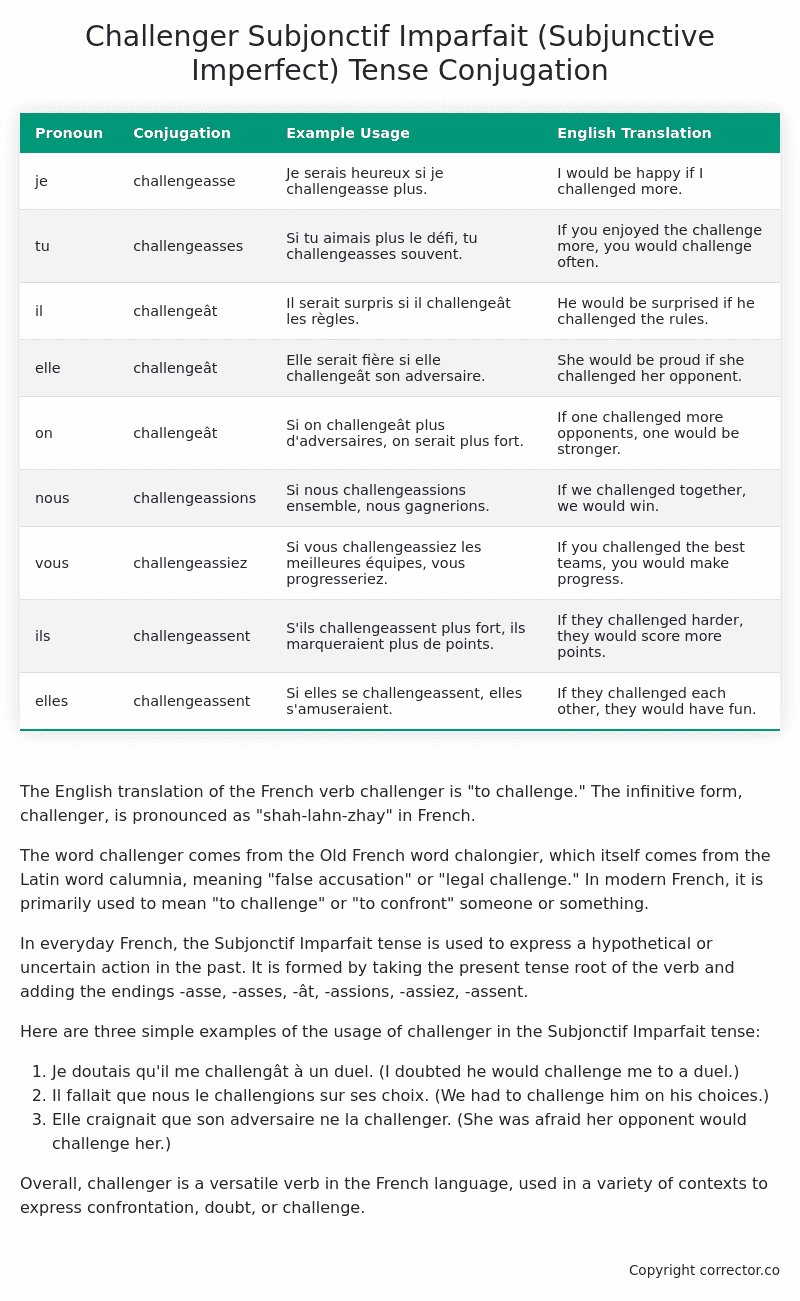Subjonctif Imparfait (Subjunctive Imperfect) Tense Conjugation of the French Verb challenger
Introduction to the verb challenger
The English translation of the French verb challenger is “to challenge.” The infinitive form, challenger, is pronounced as “shah-lahn-zhay” in French.
The word challenger comes from the Old French word chalongier, which itself comes from the Latin word calumnia, meaning “false accusation” or “legal challenge.” In modern French, it is primarily used to mean “to challenge” or “to confront” someone or something.
In everyday French, the Subjonctif Imparfait tense is used to express a hypothetical or uncertain action in the past. It is formed by taking the present tense root of the verb and adding the endings -asse, -asses, -ât, -assions, -assiez, -assent.
Here are three simple examples of the usage of challenger in the Subjonctif Imparfait tense:
- Je doutais qu’il me challengât à un duel. (I doubted he would challenge me to a duel.)
- Il fallait que nous le challengions sur ses choix. (We had to challenge him on his choices.)
- Elle craignait que son adversaire ne la challenger. (She was afraid her opponent would challenge her.)
Overall, challenger is a versatile verb in the French language, used in a variety of contexts to express confrontation, doubt, or challenge.
Table of the Subjonctif Imparfait (Subjunctive Imperfect) Tense Conjugation of challenger
| Pronoun | Conjugation | Example Usage | English Translation |
|---|---|---|---|
| je | challengeasse | Je serais heureux si je challengeasse plus. | I would be happy if I challenged more. |
| tu | challengeasses | Si tu aimais plus le défi, tu challengeasses souvent. | If you enjoyed the challenge more, you would challenge often. |
| il | challengeât | Il serait surpris si il challengeât les règles. | He would be surprised if he challenged the rules. |
| elle | challengeât | Elle serait fière si elle challengeât son adversaire. | She would be proud if she challenged her opponent. |
| on | challengeât | Si on challengeât plus d’adversaires, on serait plus fort. | If one challenged more opponents, one would be stronger. |
| nous | challengeassions | Si nous challengeassions ensemble, nous gagnerions. | If we challenged together, we would win. |
| vous | challengeassiez | Si vous challengeassiez les meilleures équipes, vous progresseriez. | If you challenged the best teams, you would make progress. |
| ils | challengeassent | S’ils challengeassent plus fort, ils marqueraient plus de points. | If they challenged harder, they would score more points. |
| elles | challengeassent | Si elles se challengeassent, elles s’amuseraient. | If they challenged each other, they would have fun. |
Other Conjugations for Challenger.
Le Present (Present Tense) Conjugation of the French Verb challenger
Imparfait (Imperfect) Tense Conjugation of the French Verb challenger
Passé Simple (Simple Past) Tense Conjugation of the French Verb challenger
Passé Composé (Present Perfect) Tense Conjugation of the French Verb challenger
Futur Simple (Simple Future) Tense Conjugation of the French Verb challenger
Futur Proche (Near Future) Tense Conjugation of the French Verb challenger
Plus-que-parfait (Pluperfect) Tense Conjugation of the French Verb challenger
Passé Antérieur (Past Anterior) Tense Conjugation of the French Verb challenger
Futur Antérieur (Future Anterior) Tense Conjugation of the French Verb challenger
Subjonctif Présent (Subjunctive Present) Tense Conjugation of the French Verb challenger
Subjonctif Passé (Subjunctive Past) Tense Conjugation of the French Verb challenger
Subjonctif Imparfait (Subjunctive Imperfect) Tense Conjugation of the French Verb challenger (this article)
Subjonctif Plus-que-parfait (Subjunctive Pluperfect) Tense Conjugation of the French Verb challenger
Conditionnel Présent (Conditional Present) Tense Conjugation of the French Verb challenger
Conditionnel Passé (Conditional Past) Tense Conjugation of the French Verb challenger
L’impératif Présent (Imperative Present) Tense Conjugation of the French Verb challenger
L’infinitif Présent (Infinitive Present) Tense Conjugation of the French Verb challenger
Struggling with French verbs or the language in general? Why not use our free French Grammar Checker – no registration required!
Get a FREE Download Study Sheet of this Conjugation 🔥
Simply right click the image below, click “save image” and get your free reference for the challenger Subjonctif Imparfait tense conjugation!

Challenger – About the French Subjonctif Imparfait (Subjunctive Imperfect) Tense
Formation
Common Everyday Usage Patterns
Interactions with Other Tenses
Subjonctif Présent
Indicatif Passé Composé
Conditional
Conditional Perfect
Summary
I hope you enjoyed this article on the verb challenger. Still in a learning mood? Check out another TOTALLY random French verb conjugation!


